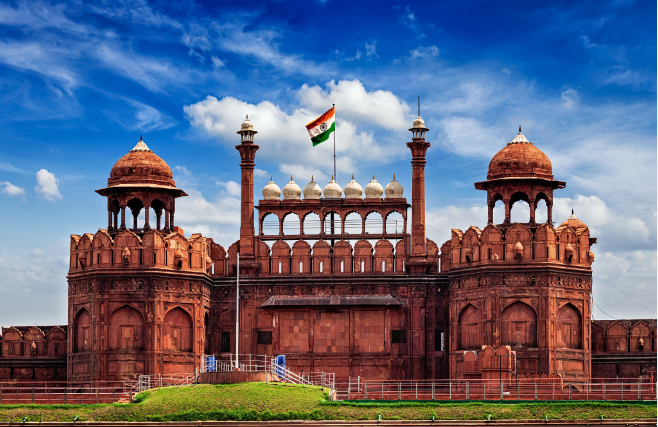INDIA

India is a desirable place to live and work because of its abundance of opportunities, low cost of living, diverse culture, and stunning scenery. Most nationalities can easily obtain a visa online or through their local Indian embassy or consulate. However, almost everyone needs a visa to visit India and applying online is the most hassle-free way to obtain a visa. The Indian government’s online e-Visa portal can be used to apply for tourist visas, business visas, and visas for medical treatment and attending conferences. India has a rich and varied cultural heritage. A fusion of customs, dialects, and culinary traditions awaits you. Living there is inviting because of the people's warmth and hospitality.
Here are some popular visa types available for India:
- Tourist Visa:
- Purpose: For leisure travel, sightseeing, and visiting friends or family.
- Eligibility: Open to tourists from most countries.
- Validity: Typically issued for 6 months or 1 year, allowing multiple entries.
- Process: Apply through the Indian embassy or consulate in your home country.
- Business Visa:
- Purpose: For business-related activities such as meetings, conferences, or exploring investment opportunities.
- Eligibility: Requires an invitation from an Indian company or organization.
- Validity: Varies based on the specific purpose.
- Process: Apply through the relevant authorities.
- Employment Visa:
- Purpose: Allows foreign nationals to work in India.
- Eligibility: Requires a job offer from an Indian employer.
- Validity: Initially issued for 1 year and renewable.
- Process: Apply through the Indian embassy or consulate.
- Student Visa:
- Purpose: For pursuing education in India.
- Eligibility: Requires admission to a recognized educational institution.
- Validity: Depends on the study program duration.
- Process: Apply through the Indian embassy or consulate.
- Medical Visa:
- Purpose: For medical treatment in India.
- Eligibility: Requires a recommendation from a recognized hospital or medical institution.
- Validity: Issued for the duration of medical treatment.
- Process: Apply through the Indian embassy or consulate.
To apply for a visa to migrate or work in India, follow these steps:
- Determine the Type of Visa:
- India offers two main types of work-related visas:
- Business Visa (B Visa): This visa is suitable for business-related visits, such as attending meetings, conferences, or exploring business opportunities.
- Employment Visa (E Visa): If you’re moving to India for employment purposes, you’ll need an employment visa. This type of visa allows you to work legally in India1.
- India offers two main types of work-related visas:
- Apply for the Appropriate Visa:
- Visit the India Visa Online portal, which is the authorized platform for visa applications. You can apply for either a regular/paper visa through an Indian Mission/Post or an eVisa through the Bureau of Immigration, Ministry of Home Affairs
- For regular/paper visas, apply through the Indian Mission/Post.
- For eVisas, apply through the Bureau of Immigration.
- Additional Considerations:
- If you plan to stay in India for more than 90 days, you’ll need to apply for a residence permit and register with the Foreigners Regional Registration Office (FRRO)
- Keep in mind that only categories exempted under bilateral arrangements may not require a visa. For persons of Indian origin, an OCI (Overseas Citizen of India) card is mandatory
Visa that allows you to work
- Employment Visa:
- The most common type of work permit for expats coming to India for employment purposes is the employment visa.
- It is typically tied to a specific job and employer and is issued for a specific duration.
- To be eligible for an employment visa, certain conditions must be met:
- The applicant should possess high skills or qualifications and be hired by an Indian company, organization, industry, or undertaking on a contract or employment basis.
- Employment visas are not issued for positions that qualified Indian candidates can fill, nor for routine, ordinary, or secretarial/clerical roles.
- The foreign national aims to work in India for an Indian-registered company or a foreign company involved in a project within India.
- The foreign national being sponsored for an employment visa in any sector must earn a salary exceeding US$ 25,000 per annum and comply with all legal obligations, including tax payments.
- The employment visa must be obtained from the applicant’s country of origin or country of domicile if they have resided there for over two years.
- Additionally, certain categories of foreign nationals are also eligible for employment visas in India, including foreign consultants, artists, coaches, sportsmen, self-employed professionals, language teachers, interpreters, specialist chefs, engineers, and technicians1.
- Project Visa:
- Project visas are granted to foreign nationals employed by foreign companies engaged in specific projects in India.
Visa that allows you to migrate
- Determine the Type of Visa:
- India offers two main types of work-related visas:
- Business Visa (B Visa): This visa is suitable for business-related visits, such as attending meetings, conferences, or exploring business opportunities.
- Employment Visa (E Visa): If you’re moving to India for employment purposes, you’ll need an employment visa. This type of visa allows you to work legally in India1.
- India offers two main types of work-related visas:
- Apply for the Appropriate Visa:
- Visit the India Visa Online portal, which is the authorized platform for visa applications. You can apply for either a regular/paper visa through an Indian Mission/Post or an eVisa through the Bureau of Immigration, Ministry of Home Affairs2.
- For regular/paper visas, apply through the Indian Mission/Post.
- For eVisas, apply through the Bureau of Immigration.
- Additional Considerations:
- If you plan to stay in India for more than 90 days, you’ll need to apply for a residence permit and register with the Foreigners Regional Registration Office (FRRO).
- Keep in mind that only categories exempted under bilateral arrangements may not require a visa. For persons of Indian origin, an OCI (Overseas Citizen of India) card is mandatory.


